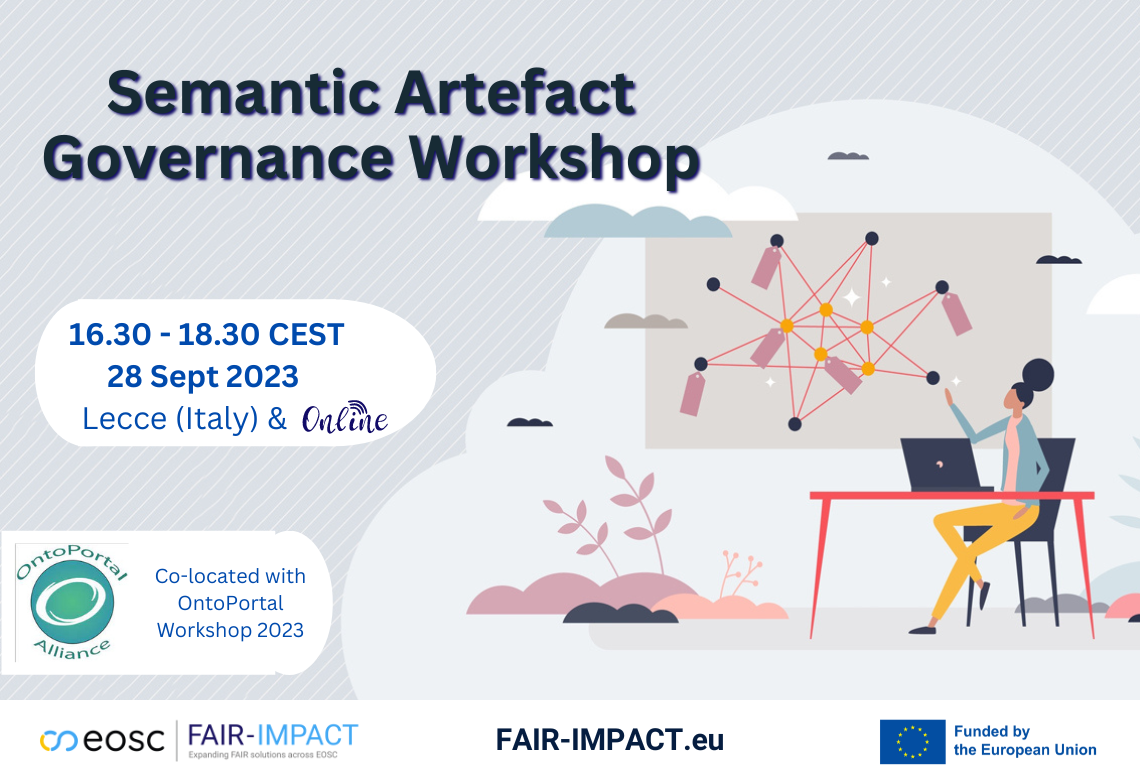When: Thursday 28 September 2023 16:30 – 18:30 CEST
Where: Lecce (Italy) and online
Italy address: Campus Studium 2000, angolo V.le San Nicola, Via di Valesio - Building 6 Rooms 1 (Google Maps)
FAIR-IMPACT organised a hybrid workshop on the topic of governance of semantic artefacts and ontologies. In partnership with communities and/or institutions expert in semantic artefacts and ontologies processing and management, the workshop's objective was to define collectively best practices for managing those semantic objects during their lifecycle.
While semantic web technologies and standards have been built to connect and add meaningfulness to data silos and create a web of data, different communities are using various tools and representation models for their semantic artefact or ontology(1). Moreover, some communities have no agreed standards and no strategies for bridging that gap, emphasizing the limited access only to the community of practice within which they were developed(2).
By retracing the fundamental steps of the governance of semantic objects according to their lifecycle, we would be able to draw up a comprehensive list(3) to achieve interoperability, integration and mapping, in order to improve their reuse among organizations or the user community.
We drew a comprehensive list of fundamental steps of semantic artefacts governance according to their lifecycle, to achieve interoperability and sustainability. The goal is to improve semantic artefacts reuse among organizations or user communities.
Download the Synthesis Report of this Workshop
References: 1) Le Franc Y, Parland-von Essen J, Bonino L, Lehväslaiho H, Coen G, Staiger C. D2.2 FAIR Semantics: First recommendations. FAIRsFAIR; 2020. doi.org/10.5281/zenodo.3707985. 2) Doron G and LeFranc Y. Enhancing the Discoverability and Interoperability of Multi-Disciplinary Semantic Repositories. S4BioDiv@ISWC; 2017. 3) https://www.fairsfair.eu/acme-fair-guide-rpo
Goal of the event
The main objective of this hybrid workshop was to review general approaches applied by different domains of knowledge and define together, within different communities, the initial requirements for developing useful semantic artefact or ontology governance models.
The product of this work will feed into "Report on semantic artefact governance models and disciplinary approaches for inclusion within EOSC" documentation being prepared by FAIR-IMPACT.
Workshop Roadmap
Multiple communities, – from agri-food to biomedicine, through astrophyisc and industry – were represented during this workshop. Through a set of guiding questions, the speakers shortly presented the governance approaches for ontologies and semantic artefacts in their community.
The addressed questions led our speakers to guide us through the aspects related to semantic artefacts such as:
- their usage in context;
- the concrete actions to guarantee their quality and sustainability;
- the processes for their implementation, versioning and maintenance;
- the stakeholders involved in their design.
The presentations were followed by a collaborative discussion on semantic artefact and ontology governance, including methodologies and levers of action to support governance workflows
The workshop agenda
Short presentations (15 min) of governance approaches for ontologies and SA will cover various topics (SA governance, lifecycle, maintenance, catalogues & governance workflows) through the following set of guiding questions. The session was chaired by Clément Jonquet (INRAE) and Nicola Fiore (LifeWatch).
- 16:30 - 16:40 Workshop ins & outs (all presentations)
- 10’ CROP Ontology project (Marie-Angelique Laporte and Elizabeth Arnaud);
- 10’ OBO Foundry (Deepak Unni);
- 10’ BASF (Paola Espinoza Arias);
- 10’ INRAE vocabularies (Sophie Aubin);
- 10’ IVOA (Baptiste Cecconi)
- 10’ NFDI4biodiversity (Naouel Karam)
- 10’ EMBL-EBI (Henriette Harmse and Zoe Pendlington);
- 10’ SAREF (Maxime Lefrancois);
- 10’ AGROVOC (Imma Subirats)
-
18:00 - 18:20 Discussion
-
18:20 - 18h30 Questions

| Attachment | Size |
|---|---|
| SpeakerSlides_FAIR-IMPACT_Semantic_Artefact_Governance_Workshop.pdf (5.17 MB) | 5.17 MB |